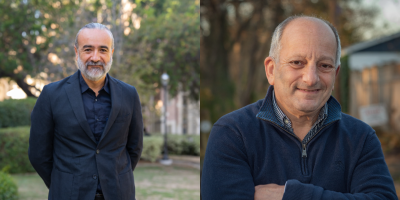All keynotes will be held in Auditorium 1 at Georg Sverdrups hus.
Pamela Grossman | Focusing on core practices and practice-based pedagogies to foster teacher development: Current and future research

Professor Pamela Grossman in conversation with QUINT research and researchers.
Teaching is among the most crucial professions in any society. We know that what teachers do in their instruction will have a significant impact on their students’ lives and learning, reaching far beyond the time spent together in the classroom. Education can be a powerful tool to increase equity, enable democracy, and eradicate poverty—and many of us have experienced firsthand the lifelong positive impact one single teacher can have on our lives.
Worldwide, scholars, policy makers and teacher educators are working toward creating sustainable and effective systems for shaping teaching quality – through teacher recruitment and education, and by providing professional development for teachers and retaining them in the job.
While acknowledging the value and importance of teachers, we also know preparing teachers for the demands of the classroom is a complex task. Research indicates that in during the preparation, teaching candidates often learn about teaching rather than how to teach, what some have termed the problem of “enactment” in teacher education. Studies from across the world have shown that teacher candidates do not consider themselves fully prepared to function as a teacher. More experienced teachers also experience a lack of opportunities to try out new practices and get feedback to help them continue to improve.
The work on core practices and pedagogies for teaching practice proposes one way to address this problem of enactment. In this keynote, QUINT researchers Marte Blikstad-Balas, Inga Staal Jenset, Michael Tengberg and Birna Svanbjörnsdóttir will share some insights and empirical examples of QUINT research studies across the Nordic countries. They will discuss how and why attention to specific core practices of teaching, in combination with the use of video as a practice-based pedagogy for teacher learning, can contribute to foster teacher development.
Professor Pam Grossman will then provide an overview of the current state of research on core practices and the pedagogies of practice from a global perspective, highlighting the work of QUINT researchers as well as other researchers and conclude with possible directions for future research in this area.
Courtney Bell | Measuring Socio-Cognitive Interactions at Scale: Challenges and Innovations in Measuring Teaching Quality in Education

Teaching quality matters—in every country, for all students. Yet the field does not agree on or use measures of teaching quality that satisfy common considerations for reliability, validity, and practicality. Dr. Bell will discuss the construct of teaching quality in its socio-historical and scientific context. Using this frame, she will report preliminary findings from a systematic review of teaching quality measurement modes. The review addresses the constraints and affordances of varied measurement modes with a focus on approaches made possible by new technological advances. By exploring the reliability, validity, and practicality of diverse measurement modes, Dr. Bell identifies potential lines of new research for QUINT collaborators and the broader international research community.
J. F. Martínez & D. Gitomer | Challenges and Opportunities of Observational Teaching Metrics to Assess and Improve Teaching (digital keynote)

Drew Gitomer is the Rose and Nicholas DeMarzo Chair in Education, Learning and Teaching, at the Rutgers Graduate School of Education.
Researchers and practitioners have long raised concerns about the modest reliability of measures of instruction derived from direct observation in classrooms, and their limited correlation with other key indicators and outcomes of instructional quality and effectiveness. The last two decades have seen some of the largest and most comprehensive studies, where this pattern of results has remained consistent, despite extensive efforts to refine protocols, rating scales, observer training, sampling, video and audio technology, and analytic methods. In this talk, we consider the implications and challenges presented by these findings for those aiming to understand, measure, and improve teaching quality from perspectives of research and practice.
We highlight methodological issues related to traditional conceptualizations of measurement error, and predictive and concurrent validity, as they relate to measures of instruction. We also consider practical and policy challenges related to the use of observation measures in instructional improvement efforts. We finally consider future directions for classroom observation, with a particular focus on alternative conceptualizations of validity focused on utility and formative contexts (Moss, 2004), with observation frameworks serving a hybrid or dual role as measurement instruments and tools for professional learning around shared understandings of teaching.
Hannah Bijlsma | Teaching quality in the Dutch educational system from the perspectives of school inspectors, students, and teachers

Because teaching quality is the most important, malleable factor that impacts student achievement, it is important to monitor the quality of teaching, in schools as well as on educational system level. In a collaborative project between the University of Twente and the Dutch School Inspectorate, an instrument was developed to collect the perceptions of observers (inspectors), students and teachers on teaching quality and we collected data at the Dutch educational system level.
In this keynote, I will present some of our findings and discuss how these insights can inform both research endeavors and practical applications within schools. Especially, I will focus on the implications of the differences between the ratings of the three rater types, how the instrument that was developed can be used in schools, and how I use it in my own teaching practice. Furthermore, some new possibilities for measuring teaching quality will be mentioned. I will end with call to action: the importance of collaboration among researchers, practitioners and policy makers for improving teaching quality in schools and on county level. And after that, the floor is open for the panel and the audience.